Football's new laws - changes to backpasses, penalties, handballs and subs for 2019-20
- Published
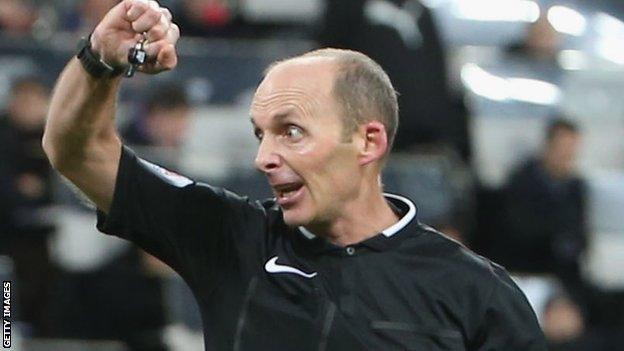
Referees including Mike Dean will be implementing a few new laws this season
Goalkeepers picking up backpasses (sort of), uncontested drop balls and more handball decisions - football's laws have changed again.
A dozen changes from the International Football Association Board (Ifab), external came in over the summer - you may have seen some of them if you were following the Women's World Cup, Africa Cup of Nations or Copa America.
But they are bound to cause plenty of talking points in the opening weeks of the season as every tournament worldwide, including the Premier League, adopts them for the coming season.
Some are quite trivial but several could make a big difference to the game.
Drop balls
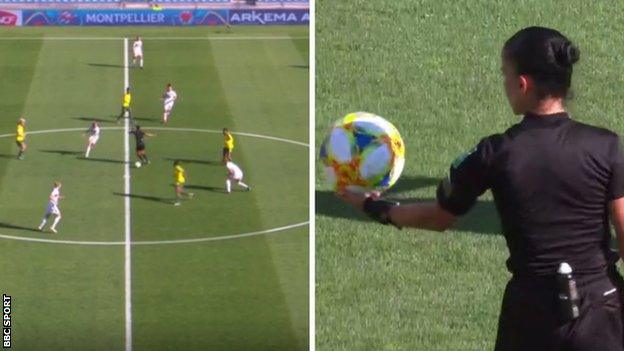
In this instance during the Women's World Cup, a South Africa pass hit the referee and landed to a Germany player. Play was stopped and South Africa were given an uncontested drop ball
Drop balls can no longer be contested, but the change is more positive than it sounds.
If play is stopped, the ball will be dropped to a player on the team that last touched the ball - and where they touched it. All other players must be 4.5 yards (4 metres) away.
What that means is if a team's attack is stopped, they will get the ball back in that position - instead of the opponents booting the ball down the field.
However, any play stopped in a penalty area will be returned to the goalkeeper, even if the attacking team had the ball.
Another big change now sees a drop ball awarded if the ball hits the referee and goes to the other team as a result, or if the referee accidentally scores a goal, as happened in the Dutch fourth division, external a week before the law change.
Handballs
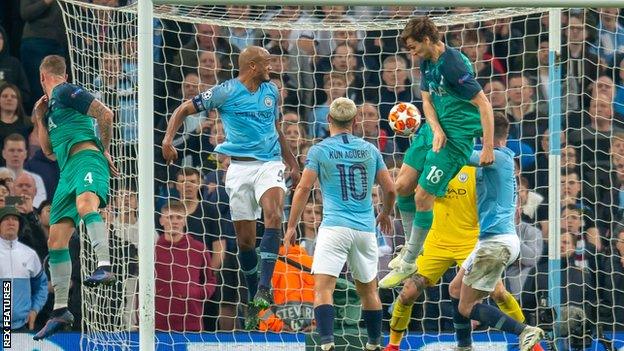
Fernando Llorente's goal against Manchester City in the Champions League would not stand under the new laws which say you cannot score with your arm, regardless of intent
The law remains that deliberate handball is an offence. But accidental handball will also be a free-kick or penalty if...
the ball goes into the goal off an attacker
a player gets the ball using his or her arm or hand and then scores, or creates a goalscoring opportunity (such as Ellen White's disallowed goal against Sweden in the Women's World Cup third-place play-off)
the player's arm or hand is above their shoulder (unless the player has controlled the ball onto his own arm or hand)
a player's hand or arm has made their body "unnaturally bigger"
'Not again!' White 'equaliser' ruled out by VAR
A handball will not be a free-kick if...
the ball is knocked on to a hand by the player in question or a nearby player
the arm or hand is close to their body and "has not made their body unnaturally bigger"
a player is falling and the ball touches their hand or arm when it is between their body and the ground to support the body - but not extended to make the body bigger
However "unnaturally bigger" is open for some debate. The Netherlands were given a penalty against Japan for handball at the Women's World Cup but Premier League referees' chief Mike Riley said "we consider that to be a natural position of the hand".
He added: "The way we've actually implemented handball for the past two or three seasons is the way we are going to continue to do it in the future."
A last-minute spot-kick from Martens wins the game for the Dutch
Another change to the handball rule relates to the goalkeeper.
If the goalkeeper attempts to clear ("release into play") a throw-in or backpass and their clearance fails, then they can handle the ball.
Ifab says this is because "when the goalkeeper clearly kicks or tries to kick the ball into play, this shows no intention to handle the ball".
Goal-kicks
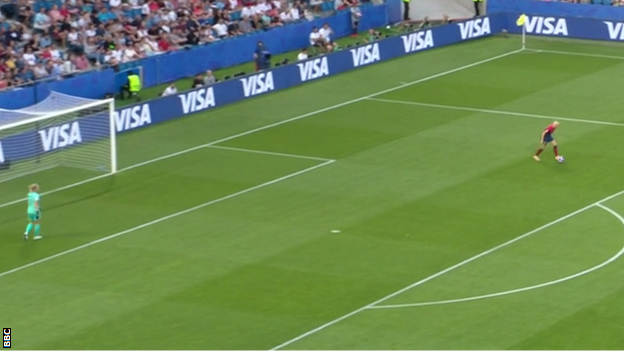
This short Norway goal-kick against England in the Women's World Cup would have been an offence last season
Another change involving goalkeepers is to goal-kicks, which can now be played to a team-mate inside the penalty area.
The law now says the ball is considered in play once the kick is taken. Until now a goal-kick had to be retaken if it did not leave the box.
Plenty of teams took advantage of this during the Women's World Cup.
It could make a big difference to teams like Liverpool and Manchester City, whose defenders can now drop into the box to receive a goal-kick.
Opponents must still remain outside the penalty area until the kick is taken.
Free-kicks
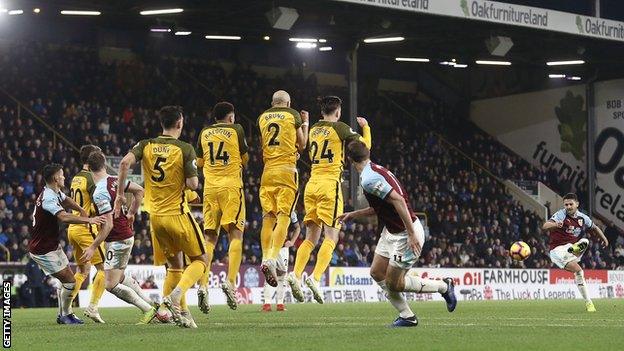
This would be an indirect free-kick to Brighton (in yellow) if it happened next season
When a defending team has three or more players in a wall, the attacking team can no longer place a player in or next to it.
If an attacker is standing within one yard (1m) of the wall when the kick is taken, they will be penalised with an indirect free-kick.
However, Spain found a bit of a loophole in the Women's World Cup, as they placed a wall of their own in front of South Africa's before moving at the last moment., external
Another change means - similar to the goal-kick change above - if a defending team takes a free-kick in their own area, the ball is considered in play immediately and does not have to leave the box before another player touches it. Again, opponents must remain outside the box.
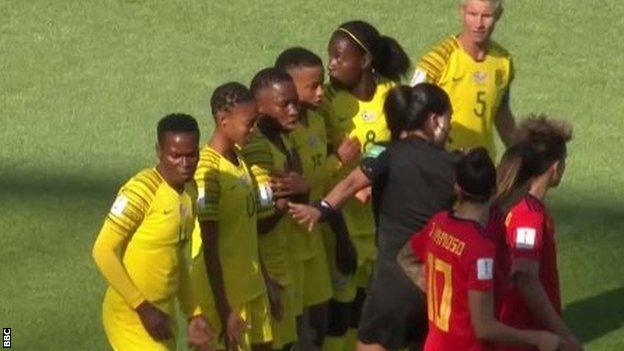
This was allowed at the Women's World Cup, because the Spanish players moved just as their free-kick was being taken against South Africa
Quick free-kicks
If the referee is about to show a yellow or red card but the non-offending team takes a quick free-kick and creates a scoring chance, the official can come back and show the card when the ball goes out of play.
Before now, the card would have to be shown before the free-kick could be taken.
However, if the referee had distracted the offending team by starting to show the card, the quick free-kick is not allowed.
Also if the offence was going to be a red card for denying an obvious goalscoring opportunity, but the opposition take a quick free-kick, then the player will only be booked because the other team are considered to have restarted their attack.
Penalties
The laws have changed concerning what goalkeepers can do for penalties.
The penalty kick cannot be taken while the goalkeeper is touching the woodwork or nets - or if the net or posts are still moving after being touched.
The goalkeeper must have one of his/her feet partly on the goalline (or above it if jumping) when the kick is taken. He or she cannot stand behind or in front of the line.
There were several instances of retakes being ordered for that offence in the Women's World Cup, most notably one that cost Scotland a place in the knockout stages.
Dramatic scenes as VAR penalty retake sends Scots home
The law will come into the Premier League this season, but the decision will be left for the on-field officials and VAR will not be used to look out for it.
The other change to penalties means an attacker can take a penalty if he needed treatment (as long as the treatment is quick).
Before now, a player would have to go off the field until after the kick was taken if he needed medical help.
Substitutions
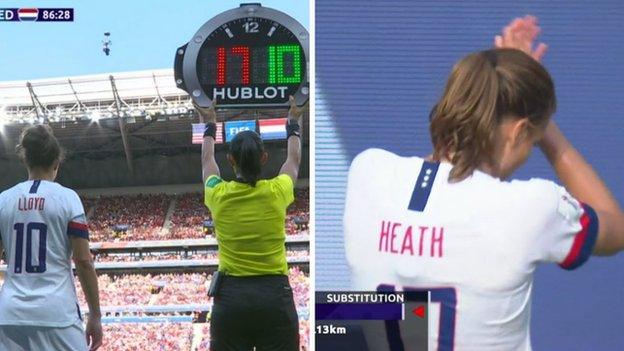
When Tobin Heath came off for Carli Lloyd in the Women's World Cup final, she came off at the opposite side of the pitch that her replacement came on
A player who is being substituted must leave the pitch by the nearest point on the touchline or byeline - unless the referee says they can leave quickly at the halfway line - or elsewhere for safety or injury reasons.
This change is to stop players time-wasting. Any player who "infringes the spirit of this law" will be booked for unsporting behaviour.
However most substitutions in the Women's World Cup saw players come off at the same point their replacement was coming on.
Cards for coaches
A team official guilty of misconduct can be shown a yellow card or red card. If the offender cannot be identified, the senior coach in the technical area at the time will receive the card.
That new system was trialled in the EFL during the 2018-19 season and is now being introduced worldwide.
The other changes
A player can now be booked for celebrating - for removing his shirt or celebrating with the fans - even if the goal is disallowed.
The team that wins the pre-match coin toss can now choose whether to take the kick-off or which goal to attack - previously they could only choose which goal to attack.
There is now a difference between cooling breaks (90 seconds to three minutes) and drinks breaks (maximum of one minute) in certain competitions played in high humidity and temperatures.
Multi-coloured or patterned undershirts are allowed if they are the same as the sleeve of the main shirt.
An initial version of this article was published on 1 June 2019.